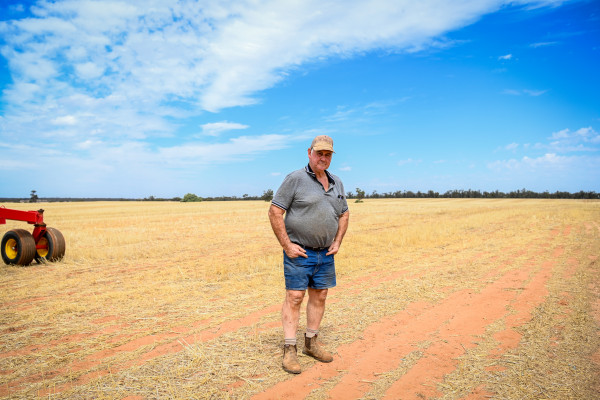RON Hards might be passing the baton to son Nick, but the legacy he is handing on with it will prove to be the real gift.
Because it was the vision of Ron, and others like him, who banded together to found Mallee Sustainable Farming and plug what he had seen as a glaring extension gap – the low rainfall areas, not just of his district but right through the Mallee, from SA across Victoria and into NSW.
He says the 250mm-350mm rainfall belt had somehow been overlooked but a group of farmers, spearheaded by Neil Smith, got together in 1997 after a public meeting at Loxton in SA and MSF was born.
It would prove, Ron recalls, a hard road to hoe, and even though it began with the support of the Grains Research and Development Corporation, he says its funding during the formative years was very hit and miss.
“It was tough, we were trying to run it all, at times, with barely $1 million, but things are so much better now, it all seems to be secure and we have a really god team and the money to keep it all going forward,” he says.
“When we got it established I initially stepped back because I was also president of the VFF grains group at the time.
“But when I did come back into it as a board member in 2010 it was fast becoming a stable and effective organisation and today it is going very well, with a good team at the helm.”
As well as changing the big picture, MSF was having a big impact on Ron’s own farm.
Where strategies such as no-till, rotations and more effective use of inputs have boosted production, cut costs and turned some of the nation’s riskiest farming country into a very viable proposition.
“On our place I guess you would say we were very traditional, we ran fallow, cultivated and used the same fertiliser program,” Ron explains.
“Now we are all no-till, are committed to rotations and are far more effective with our use of things such as urea,” he says.
“I won’t say we’re foolproof but by and large this is now a productive, solid farming area and so much better than it was before MSF came along.
“Through it all one of the main things has been the rotations, apart from anything else they are so effective in weed control.
“Grasses are a curse in any cropping area, and if you can keep those grasses under control in your legume phases, and sometimes we might run two legumes in a row, peas and vetch or, peas and lentils or whatever, however we do it to get two grass control phases in your legume crops before you get back into cereals.
“When Nick and I were looking at it we agreed we were going to go the whole way with no-till, not be higgledy-piggledy about it, but even then it took us five years, I reckon, to get it right, get the paddocks and soils used to it, but we never looked back.”
Across the family’s 9000 acres of all cropping – with trade lambs usually brought into tidy up paddocks after harvest – things are now going very smoothly – although there were no sheep this harvest.
“So it’s a fairly intensive system and monitoring is a big thing,” he says.
“We probably monitor weeds in paddocks three or four times a year and make sure that we know what we’ve got, and it doesn’t take very much grass in one year if you let it seed and let it go through and do another crop.
“It’s very quick to take over and so you’ve got to watch it very closely and make sure you’ve got it under control.
“The no-till has also seen nitrogen levels up, and it’s just an added benefit though I think from no till, where all the legumes you put in bring a really good dose of natural nitrogen into the soil, and you can certainly see the benefits in the following crops, especially when you go back to cereals.
“You know I think its invaluable the fact you can do that absolutely free, just transitioning nitrogen from the air into the soil. It is great.”
Even greater, Ron reckons, is seeing how much of your farm stays where it belongs – in the paddocks.
He recalls there being nothing worse than being home looking through the windows, or out in the shed, on a windy day, “and watch your paddocks go past”.
Now with his new management program that is more a thing of the past and a lot of that is thanks to Mallee Sustainable Farming.
* Check out next week’s North West Farmer for in in-depth look at life on a Mallee farm.
















